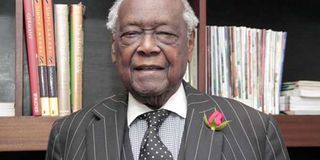Gems from history as former AG Charles Njonjo turns 98

Former attorney general Charles Njonjo during an interview at his Westlands office on May 15, 2015. PHOTO | DIANA NGILA | NATION MEDIA GROUP
What you need to know:
- Kenya’s first indigenous attorney-general Charles Njonjo, often referred to as ‘The Duke of Kabeteshire’ for his English mannerisms, turned 98 Tuesday.
- ‘Sir’ Charles was a central player in Kenya’s politics during the Kenyatta and Moi eras before his ignominious downfall in 1983.
- Although he was a tough legal mind in his heyday, he is said to have been shy around women, which perhaps explains why he married Margaret Bryson, in 1972, at the age of 52.
Kenya’s first black attorney general Charles Njonjo turned 98 years Tuesday.
Mr Njonjo, often referred to as the “Duke of Kabeteshire” for his English mannerisms, was a central player in Kenya’s politics in the eras of founding President Jomo Kenyatta and his successor Daniel arap Moi.
KENYATTA
From 1963, when President Kenyatta appointed him to replace A.M.F Webb, QC, as attorney general, Mr Njonjo bestrode Kenya’s legal and political landscape, scheming on Kenyatta’s succession before his downfall in 1983.
Mr Njonjo was widely suspected to have been plotting to succeed President Kenyatta, which placed him at odds with other contenders from Central Kenya who felt they were better suited for the job.
Ostracised by fellow politicians from Mount Kenya region, he formed an unlikely alliance with Vice President Moi, who was generally held in low regard — as a passing cloud — by the schemers around President Kenyatta, who came up with a plot to lock out the VP from automatically succeeding President Kenyatta.
First, they formed an organisation called Gikuyu, Embu, Meru Alliance (Gema), which was initially sold as a cultural movement to unite the three communities that inhabit the region around Mt Kenya.
But Gema soon became a political behemoth that threatened to eclipse President Kenyatta’s prominence in the region.
MOI
Led by former Kiambaa MP and billionaire businessman Njenga Karume and former Nakuru North MP Kihika Kimani, they started what was termed to as the “Change the Constitution Movement” whose sole aim was to block VP Moi’s ascendancy to the presidency upon President Kenyatta’s death.
Seeing his “project” (Moi), threatened by powerful Gema forces, Mr Njonjo neutralised them with a single masterstroke: he decreed that it was treasonable to imagine the death of the President and, therefore, all those agitating for constitutional changes had committed a crime punishable by death.
“Therefore, Njonjo said, those who had (called for constitutional changes) had not only imagined the death of the President, they had stated it outright, through the use of loudspeakers,” said Mr Karume in his 2009 biography Beyond Expectations: From Charcoal to Gold.
“They (Gema leaders) were on record for having uttered words that insinuated the President’s death, and Njonjo told the press that he had a watertight case against them. No doubt Njonjo was congratulating himself as he spoke. His counter-attack was ingenious,” he said.
Scholars argue that Mr Njonjo’s edict, and many other tweaks to the Constitution which he engineered to ingratiate himself with Kenyatta, ultimately reinforced the imperial presidency which was to haunt Kenya for decades.
SNAP ELECTION
Although President Kenyatta never took the treason charges seriously, Gema members found it increasingly difficult to articulate their clamour for change openly without being seen as disrespectful to the President. By the time he died in August 1978, the group had largely fizzled out.
Mr Moi assumed office following President Kenyatta’s death without a legal hitch — thanks in large part to Mr Njonjo’s scheming. But in the classic Machiavellian manner, Mr Moi set in motion events to cut his “kingmaker”, his attorney general, to size.
In 1980 snap elections, Mr Njonjo quit his post as attorney general and ran for and won the Kikuyu constituency Parliamentary seat. Moi appointed him Minister for Constitutional Affairs. In August 1982, a group of soldiers mainly from the Kenya Airforce staged an unsuccessful coup against President Moi.
Mr Njonjo’s name was heavily mentioned in the planning of the coup, though the Justice Cecil Miller-led commission that investigated these allegations found little evidence about his involvement.
Mr Njonjo has always denied any involvement in the coup plot, telling one newspaper in a 2006 interview that had he planned the coup, it would have succeeded.
Nonetheless, he was forced to resign as an MP in 1983. He then kept a low profile, largely concentrating on his vast business empire.





